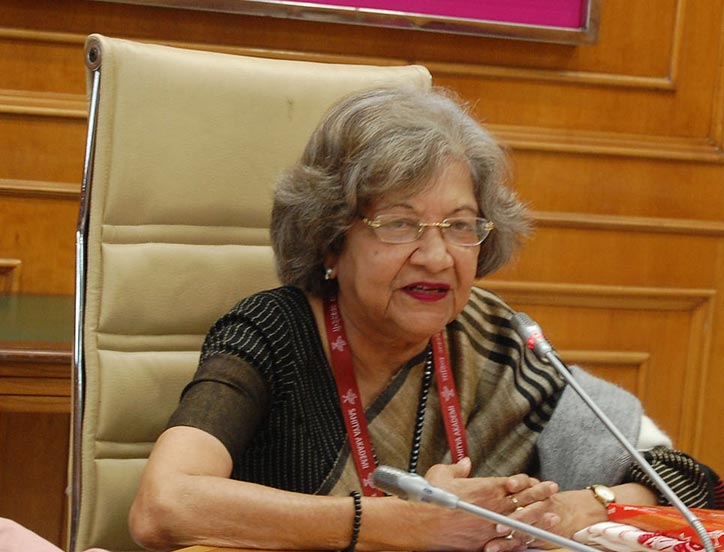 New Delhi:
New Delhi: On the occasion of International Women’s Day, Sahitya Akademi organized an All India Women Writers’ Meet on 8 March 2019, at Sahitya Akademi Auditorium, Rabindra Bhavan, New Delhi.The inaugural Session began at 10 am. Dr. K. Sreenivasarao, Secretary, Sahitya Akademi, welcomed the dignitaries, Mridula Garg and Dr Sukrita Paul Kumar, with a packet of Akademi publications.
While Mridula Garg, eminent Hindi writer, delivered the Inaugural Address, the Keynote address was given by Dr Sukrita Paul Kumar, well-known English scholar and academic. Smt Mridula Garg said that both men and women are responsible for bringing in changes in the society. What we write has an impact on the way people think and behave.
Hence, she asserted, it’s time we, especially women, shed our shame, and write what we think is right and bring in positive changes in the society. Dr Sukrita Paul Kumar, in her keynote address, stressed that writers use their language in a way that triggers sensitivities, and bring in immense changes in society.
She encouraged both men and women writers to acknowledge the power of the pen, and at the end, remembered Simone de Beauvoir who instilled a conviction in women that they can change their status and situation themselves.
Dr K. Sreenivasarao, in his welcome address said that women writers are capable of writing on any subject and any in genre, and what they have contributed to the world of literature is remarkable. Women, he affirmed, are the most essential of all components that make society and without them the establishment and continuation of customs and practices will not be possible.
Dr Sivasankari chaired the first session of this event. She stated that we need men’s equal participation to survive peacefully in a society and later presented a lecture on the short stories of India.
The participants of this session were Ms Anamika Bora (Assamese) who read a story on the agony of a wife whose husband marries another woman; Ms Urmila Shirish (Hindi), whose story focused on a mother’s anxiety as her son gets ready to leave home; Ms Jyoti Kunkoliekar (Konkani) whose story was titled “Tu Jeeti, Main Haari”; and Ms Lathalakshmi Menon (Malayalam) who read her story entitled “Dolphin Smiles.”
Ms. Sivasankari read her story that described how a lower class girl giving birth to a child was given the rough and primitive treatment by the midwife, which at first looked crude, but ensured quick recovery of the mother and the fast healing of the newborn’s navel. At the same time, the lady of the house for whom the young woman’s mother is working faces a grim fate. Her sister’s newborn dies due to infection of the navel, in a high class maternity hospital in the city!
The second session was devoted to poetry and was chaired by Dr Yashodhara Mishra. She was of the opinion that the concept of Ardh-Naareeshwar proves that the notion of peaceful co-existence of men and women has been in India’s history for ages. She read her poem “Submerging Town” at the end. The poets of this session were Ms Raka Dasgupta (Bengali), Ms Sushma Rani (Dogri), Ms Lata Hirani (Gujarati), Ms Kalpana Jha (Maithili), Ms Sarita Sinha (Manipuri), MS Amia Kunwar (Punjabi), MS Uma Rani Tripathi (Sanskrit), Ms C. Bhawani Devi (Telegu) and Ms Tarannum Riyaz (Urdu).
The last session, which was also devoted to poetry, too, saw some very interesting presentations, with Ms Rehana Kousar (Kashmiri) singing soothing ghazals and nazms, and Ms Pavitra Lama (Nepali) performing a very powerful poem with music and acting. The chair of this session, Dr Lakshmi Kannan, raised the question as to why a woman writing about domesticity is laughed at and looked down upon, while a man painting a scene in the kitchen is admired by all. Ms Binita Goyary (Bodo), Ms B. Sukanya Maruthi (Kannada), Ms Yogini Satarkar (Marathi), Ms Reeta Rani Nayak (Odia), Ms Suman Bissa (Rajasthani), Ms Yashoda Murmu (Santali) and Ms Mohini Hingorani (Sindhi) also presented their poems in this session.
A lively question-answer round followed the last session.
 New Delhi: On the occasion of International Women’s Day, Sahitya Akademi organized an All India Women Writers’ Meet on 8 March 2019, at Sahitya Akademi Auditorium, Rabindra Bhavan, New Delhi.The inaugural Session began at 10 am. Dr. K. Sreenivasarao, Secretary, Sahitya Akademi, welcomed the dignitaries, Mridula Garg and Dr Sukrita Paul Kumar, with a packet of Akademi publications.
New Delhi: On the occasion of International Women’s Day, Sahitya Akademi organized an All India Women Writers’ Meet on 8 March 2019, at Sahitya Akademi Auditorium, Rabindra Bhavan, New Delhi.The inaugural Session began at 10 am. Dr. K. Sreenivasarao, Secretary, Sahitya Akademi, welcomed the dignitaries, Mridula Garg and Dr Sukrita Paul Kumar, with a packet of Akademi publications. 